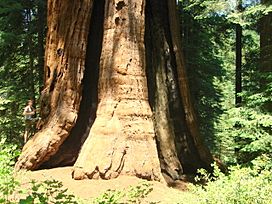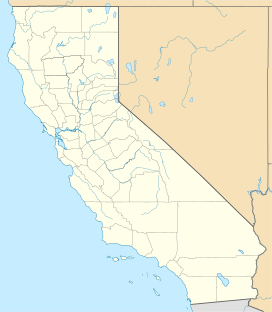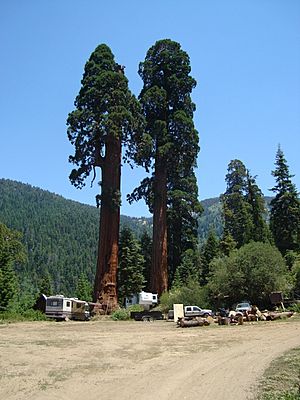Alder Creek Grove facts for kids
Quick facts for kids Alder Creek Grove |
|
|---|---|

The Stagg Tree, fifth largest tree in the world by board feet
|
|
| Map | |
| Geography | |
| Location | Tulare County, California, United States |
| Coordinates | 36°11′08″N 118°37′41″W / 36.1855°N 118.6281°W |
| Elevation | 6,960 ft (2,120 m) |
| Area | 785 acres (318 ha) |
| Ecology | |
| Dominant tree species | Sequoiadendron giganteum |
Alder Creek Grove is a special place in California. It's home to giant sequoia trees, which are some of the biggest trees on Earth! This grove is partly on private land and partly inside the Giant Sequoia National Monument. It covers about 785 acres (318 hectares) and has 483 giant sequoias that are at least 25.5 feet (7.8 meters) wide.
One of its most famous trees is the Stagg Tree. It's the fifth largest tree in the world. It is also one of the oldest known living giant sequoias. Even though some of the land was private, the Rouch family allowed people to visit parts of it.
Contents
Saving Alder Creek Grove
In 1946, the Rouch family bought much of Alder Creek Grove. They planned to cut down trees and build on the land. They did log some trees in the late 1940s and early 1950s. However, cutting down giant sequoias was not easy. Their wood is brittle, meaning it breaks easily. The family also felt bad about cutting down these huge trees. About two dozen giant sequoias were cut, but no especially large or old ones were harmed.
Around the same time, a neighborhood called Sequoia Crest was built next to the grove. It had 236 lots for summer cabins. This allowed people to visit the Stagg Tree and other giant sequoias nearby. A short-lived ski resort was also built to help the family make money from the land.
On September 17, 2019, an organization called the Save the Redwoods League made a big announcement. They agreed to pay the Rouch family $15.6 million to protect the giant sequoias on their land. This included the amazing Stagg Tree.
Protecting the Grove's Future
The deal to save Alder Creek Grove was completed on December 31, 2019. Over 8,500 people from all over the United States and most major continents donated money. They raised the $15.6 million in less than six months!
After the deal was done, the Save the Redwoods League planned to do more. They will spend another $4.75 million on studying the ecosystem and restoring the area. This includes thinning out smaller trees (but not sequoias) and using controlled fires. These actions will help the grove become healthier.
Once this work is finished, the League will give the grove to the U.S. Forest Service. It will then become part of the Giant Sequoia National Monument. This will make Alder Creek Grove the largest giant sequoia grove managed by the U.S. Forest Service. It will be even bigger than the Boole Tree grove, which was the largest before.
What Makes Alder Creek Grove Special?
Alder Creek Grove is very diverse. It has trees of many different ages and sizes. You can find tiny seedlings and giant sequoias that are 3,000 years old!
The grove also has other types of mature trees. These include red fir, white fir, ponderosa pine, and sugar pine trees. They grow mixed in with the giant sequoias. The grove is also home to beautiful meadows, wetlands, and lush woodlands along the creeks.
Famous Trees in the Grove
- Stagg: This is the fifth largest giant sequoia in the world. It has a volume of about 42,557 cubic feet (1,205 cubic meters). The tree was found in 1960. It was named after Amos Alonzo Stagg, a famous American athlete and coach. The tree is on private property, but visitors are allowed. You can park where signs tell you and walk a 0.33-mile (0.53 km) trail to see it.
- Waterfall: This giant sequoia has the largest base of any living giant sequoia. Its ground perimeter measures 140.1 feet (42.7 meters)! The tree's huge base helps it grow on the steep bank of South Alder Creek. It gets much narrower as it grows taller. It is about 225 feet (69 meters) high.
- Window: This giant sequoia has a large "window" opening in its trunk. This opening formed when the tree became weak from disease. Later, lightning struck it, creating the unique window.



